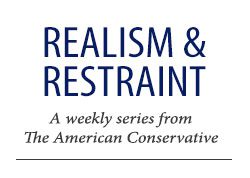17 Rules for Foreign Interventions

After trillions of dollars spent, thousands of dead and wounded, and the creation of myriad new terrorist enemies, Washington could learn a few lessons when considering future interventions.
 1. Do not attempt to establish multi-ethnic democracies in nations with no traditions of limited government. Each faction believes that “an alien master is worst of all” and dreads the certain prospect of total subordination to the election victors. Do not foster electoral ceremonies where freedom from fear and the rule of law are absent: they beget, at best, the democratic centralism of Lenin. Never propagate civil wars: the revenge killings last for a hundred years.
1. Do not attempt to establish multi-ethnic democracies in nations with no traditions of limited government. Each faction believes that “an alien master is worst of all” and dreads the certain prospect of total subordination to the election victors. Do not foster electoral ceremonies where freedom from fear and the rule of law are absent: they beget, at best, the democratic centralism of Lenin. Never propagate civil wars: the revenge killings last for a hundred years.
2. Remember that, as George Kennan said, the worst of rulers knows things about his country that foreigners do not. Respect the beliefs of simple folk, however misguided: rapid dislocations produce horrors directed at the harbingers of modernity. Remember the dangers of government by military, theocratic, and academic castes, who live in self-created welfare states and do not share the economic experiences of the general population.
3. Do not resist secessionist movements. They allow smaller groups to be satisfied with their governments. Be mindful of the happy fates of the parties to the “velvet divorce” in Czechoslovakia, of the Central Asian republics of the Soviet Union. Be mindful of the costs of our Civil War, and of the waving of the bloody shirt that ensued, and be hesitant in guaranteeing perversely drawn frontiers, like those in the Middle East, the former Soviet Union and Yugoslavia, and Africa. Be suspicious of excessively large states whose tribal divisions and lack of transportation facilities render them ungovernable by any ruler, e.g., the Congo, Angola, Nigeria.
4. Do not denigrate religious and non-economic values. Without these norms, the survival of morality and social peace becomes a function of the business cycle. Remember that the traditional division of labor between the sexes makes sense in hunter-gatherer, agricultural, and manufacturing economies. Remember also that all occupying armies swiftly earn resentment, as they appropriate or bid up the cost of goods and women. Respect the lessons of the 1648 Treaty of Westphalia, which ended the European religious wars that had killed off a third of the continent’s population. It bought relative peace for 150 years.
5. Remember that wars waged without UN Security Council support must be paid for without the help of other nations. Listen to allies, even if they appear to be weak. France and Britain produced the postwar Schuman Plan and Brussels Pact. America, on its own, has generated grandiose fiascos—the European Army and Multilateral Nuclear Force. Accept the “five policemen”— the U.S., Russia, Britain, France, and China—as the basis of international order. Foster cooperation between them, or at least respect for their separate spheres of influence.
6. Remember that wars cannot be won on the cheap, without infantry. Refugee flows inevitably accompany war, and avoidance of them is a vital national interest. Forswear inciting war fever; do not forget Jacob Burckhardt’s maxim that “when vote-catching starts on the street and calls for war, everyone feels ashamed and does likewise so as at all costs not to be thought cowardly.”
7. Detest and abhor proportional representation in elections, allocating seats to large and small parties on the basis of their percentage of the national vote. This is what gave us Weimar, the Third and Fourth Republics, and the present Israeli Knesset. (See a good explanation of the system.)
8. Do not discourage or be shocked by limitation of the franchise, including literacy tests and property qualifications. Such rules played a useful part in Anglo-American history. Foster indirect elections, as in parliamentary elections and the original American constitution. They allow the character of officials to be assessed by those who know something about them. Even nominated parliaments have their uses; witness the barons at Runnymede. If asked for political models, commend the German Basic Law, not the U.S. or South African Constitutions.
9. Foster local rather than central government. (Of course, as a “foreign-affairs expert,” you are so grandiose or lighter than air that you may not live in a locality or participate in its government.) Be aware of the destructive aspects of nationalism—the 20th-century disease—and of its survival in the United States, Israel, and elsewhere.
10. Draw foreign-affairs officials from those versed in history and literature: the study of how human beings have behaved in fact. Banish game theorists, micro-economists, public-choice theorists, moral philosophers, and “just war” theorists; little good can come of their presence. Remember that international understanding in its literal sense is impossible without the intensive study of languages. Do not auction or indulge nepotism in the distribution of diplomatic posts; it demoralizes bureaucracies, and local knowledge cannot be replaced by fly-in experts, however brilliant.
11. Remember that economic sanctions are not measures short of war but, as Herbert Hoover and others reminded us, measures of total war. Sanctions foster government control and rationing, do not injure the military, and victimize merchants and intellectuals. Avoid the creation of “hermit kingdoms”; maintain channels of academic, economic, and press communication, and do not neglect the importance of translations of foreign publications.
12. Respect public opinion rather than polls; nurture intelligent discussion. Beware of governments, domestic or foreign, that centralize control over culture, morals, or education. Foster the development of foreign correspondents, and recruit young “stringers” and part-time academics to replace the loss of serious journalists. Remember the harm that an unchecked gutter press did to the politics of France and Central Europe, and do not accept present American law as the last word on that subject.
13. Remember that there is more to law than constitutional law, lest law schools become “schools for misrule.” Avoid the exportation of “rights talk,” and the exportation of such manifestations of it as class actions and international criminal courts. Remember that the U.S. Constitution has a pardoning power for a reason. Recall that the central functions of courts are the prevention of arbitrary imprisonment and the maintenance of predictability in private relations.
14. Do not let devotion to free markets cause you to forget about class envy. As Bertrand de Jouvenal wrote, “the wealth of merchants is resented more than the pomp of rulers.” Do not indulge the illusion that economics trumps injuries to self-esteem in the relations of nations.
15. Foster open societies, but not equal ones.
16. Heed Kennan’s call for gardeners rather than physicists in foreign relations. Focus foreign aid on land titling, justice systems, swift creditors’ remedies, public-health services, language education, and agricultural research.
17. Lower trade barriers and help create the basis for a stable currency. As John Paton Davies wrote in Foreign and Other Affairs, “[w]ith these, the underdeveloped countries can begin to pay their own way, moving at their own pace and in their own fashion—a wholesome thing for them, and a wholesome thing for us.”
George Liebmann is a Baltimore lawyer and senior academic visitor at Wolfson College, Cambridge. He is the author of The Common Law Tradition: A Collective Portrait of Five Legal Scholars.
Comments